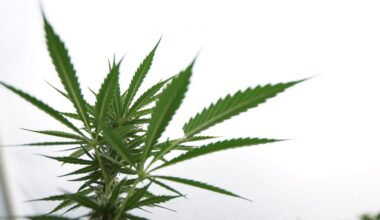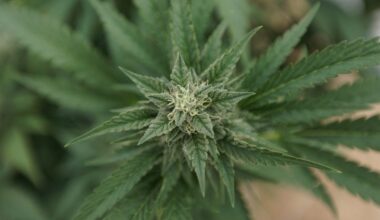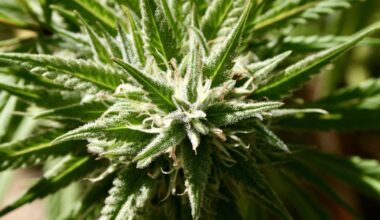California bills to legalize psychedelics possession, create the infrastructure to allow interstate marijuana commerce, prohibit localities from banning medical cannabis delivery services and impose new labeling requirements for cannabis products are all teed up for consideration in a key Assembly committee next week.
The Assembly Appropriations Committee placed all four of those proposals, as well as a litany of unrelated measures, on its suspense file on Wednesday. If the panel approves the Senate-passed bills at a follow-up meeting next week, they will then head to the Assembly floor.
There was no discussion of any of those bills during the panel’s lengthy meeting on hundreds of pieces of legislation on Wednesday, but the procedural development is positive news for advocates who are eager to advance reform this session. Lawmakers are more likely to debate the proposals when they meet next week.
Here’s a breakdown of the drug policy measures that will be considered in the committee before potentially moving to the floor:
SB 519: Sen. Scott Wiener (D) has put significant work into a bill that would legalize the possession of certain amounts of psychedelics like psilocybin and MDMA by adults 21 and older. It’s already passed the Senate and moved through two Assembly committees, but it was placed on pause last year in order to give the sponsor more time to build support.
The senator told Marijuana Moment late last year that he felt the measure had a “50/50” chance of being enacted into law this year.
The legislation would remove criminal penalties for possessing substances like psilocybin, DMT, MDMA and LSA for adults 21 and older.
If the Appropriations Committee does ultimately clear the bill for floor consideration and it passes in the full chamber, it would still need to go back to the Senate for approval of Assembly amendments before potentially heading to Gov. Gavin Newsom’s (D) desk.
Our bill to decriminalize possession & use of psychedelic drugs is facing its final committee hurdle next week. Thank you to the Sac Bee Editorial Board for supporting the bill with this thoughtful piece. @SacBeeEditBoard @sacbee_news https://t.co/6HeRsKUk9Y
— Senator Scott Wiener (@Scott_Wiener) August 3, 2022
There’s been some tension within the psychedelics advocacy community over the proposal, which was previously amended to include possession limits and remove ketamine from the list of substances that would no longer be criminalized.
Under the measure, the state Department of Public Health would be required to establish a working group “to study and make recommendations regarding possible regulatory systems that California could adopt to promote safe and equitable access to certain substances in permitted legal contexts.” Those recommendations would be due by January 1, 2024.
For psilocybin specifically, the legislation would repeal provisions in California statute that prohibit the cultivation or transportation of “any spores or mycelium capable of producing mushrooms or other material” that contain the psychoactive ingredient.
The bill originally included record sealing and resentencing provisions for people previously convicted of psychedelics possession offenses, but that language was removed in its last committee stop prior to the Senate floor vote as part of an amendment from the sponsor.
SB 1186: Another bill from Wiener, the legislation would “prohibit a local jurisdiction from adopting or enforcing any regulation that prohibits the retail sale by delivery within the local jurisdiction of medicinal cannabis to medicinal cannabis patients or their primary caregivers by medicinal cannabis businesses.”
Currently, more than half of the state’s cities and counties do not allow any type of cannabis licensees to operate in their area, which has created a regulatory vacuum that many feel is allowing the illicit market to thrive. This legislation is aimed at promoting patient access, but it could theoretically help address that overarching problem.
State officials launched a new resource in May, providing people with an interactive map showing where marijuana businesses are permitted—and where they are blocked from opening—throughout the state.
Newsom also recently signed a budget bill that includes a provision to create a $20 million one-time grant program to support the development and implementation of local retail licensing efforts.
—
Marijuana Moment is tracking more than 1,500 cannabis, psychedelics and drug policy bills in state legislatures and Congress this year. Patreon supporters pledging at least $25/month get access to our interactive maps, charts and hearing calendar so they don’t miss any developments.![]()
Learn more about our marijuana bill tracker and become a supporter on Patreon to get access.
—
SB 1326: Sen. Anna Caballero (D) had a bill placed on the Appropriations Committee suspense file that would set the stage to allow for interstate marijuana commerce from California to other legal states, as long as the federal government allows for it through legislation or a Justice Department waiver.
“The bill would prohibit an entity with a commercial cannabis license issued under the laws of another state from engaging in commercial cannabis activity within the boundaries of this state without a state license, or within a local jurisdiction without a license, permit, or other authorization issued by the local jurisdiction,” a legislative analysis says.
Late last year, a campaign called the Alliance for Sensible Markets started rallying the business community to join them in asking governors from four key states, including California, to seek Justice Department guidance on interstate cannabis commerce.
Oregon Gov. Kate Brown (D) has already signaled that she’d be on board, signing a bill in 2019 that would allow marijuana to be imported and exported from other states if federal law or policy provides for it. Activists had hoped to get similar legislation enacted in California last year, but the coronavirus pandemic derailed that.
Shortly after Oregon’s governor signed the interstate commerce bill, two members of the state’s congressional delegation filed a measure that would similarly allow for such activity, preventing the Justice Department from interfering in states that have affirmative agreements to sell marijuana across state lines. The legislation did not advance, however.
SB 1097: A bill from Sen. Richard Pan (D) that also advanced to the suspense file on Wednesday would require the state Department of Cannabis Control (DCC) to “adopt regulations to require cannabis and cannabis product labels and inserts to include a clear and prominent warning regarding the risks that cannabis use may contribute to mental health problems, in addition to existing labeling requirements.”
There are already labeling requirements for marijuana products sold in California, but Pan’s legislation would impose new rules—a proposal that some industry groups feel is unnecessary.
The legislation would also require DCC to create and post public pamphlets with “prescribed information, including, among other things, the recommendation that new users start with lower doses and the dangers of purchasing illegally sold cannabis and cannabis products.”
Here’s an overview of recent drug policy developments in California:
Another bill that Wiener is sponsoring to create a pilot program for safe drug consumption sites in certain areas of California is advancing. The legislation cleared its final legislative vote this week and now heads to the governor’s desk.
Last month, California officials awarded more than $1.7 million in grants help promote sustainable marijuana cultivation practices and assist growers with obtaining their annual licenses. A total of $6 million will be allotted through the program, which was first announced in August 2021 and will remain open for applications through April 2023.
Regulators also recently announced that they are soliciting input on proposed rules to standardize cannabis testing methods in the state—an effort that they hope will stop marijuana businesses from “laboratory shopping” to find facilities that are more likely to show higher THC concentrations that they can then boast for their products.
Meanwhile, California officials are distributing another round of community reinvestment grants totaling $35.5 million with tax revenue generated from recreational marijuana sales.
The Governor’s Office of Business and Economic Development (GO-Biz) announced last month that they’ve awarded 78 grants to organizations throughout the state that will support economic and social development in communities disproportionately impacted by the war on drugs.
The amount of funding and number of recipients increased from last year’s levels, when the state awarded about $29 million in grants to 58 nonprofit organizations through the CalCRG program.
California has taken in nearly $4 billion in marijuana tax revenue since the state’s adult-use market launched in 2018, the Department of Tax and Fee Administration (CDTFA) reported late last month. And for the first quarter of 2022, the state saw about $294 million in cannabis revenue generated from the excise, cultivation and sales tax on marijuana.
The state collected about $817 million in adult-use marijuana tax revenue during the last fiscal year. That represented 55 percent more cannabis earnings for state coffers than was generated in the 2020-2021 period.
California officials also announced in January that the state had awarded $100 million in funding to help develop local marijuana markets, in part by getting cannabis businesses fully licensed.
Image element courtesy of Kristie Gianopulos.
Medical Disclaimer:
The information provided in these blog posts is intended for general informational and educational purposes only. It is not a substitute for professional medical advice, diagnosis, or treatment. Always seek the advice of your physician or other qualified healthcare provider with any questions you may have regarding a medical condition. The use of any information provided in these blog posts is solely at your own risk. The authors and the website do not recommend or endorse any specific products, treatments, or procedures mentioned. Reliance on any information in these blog posts is solely at your own discretion.







